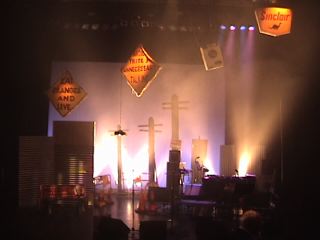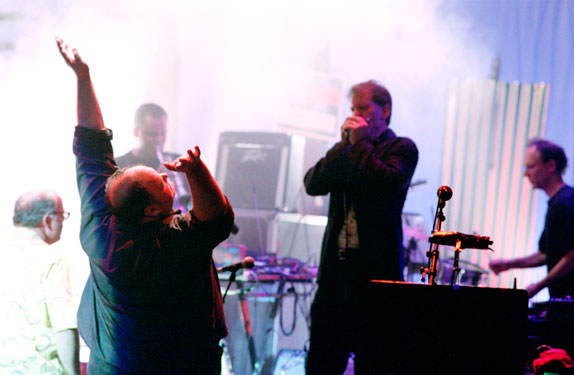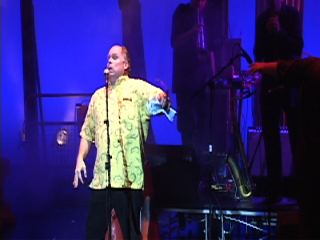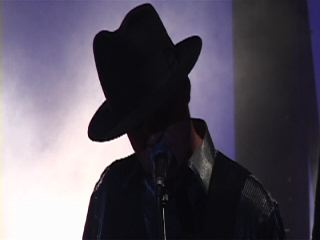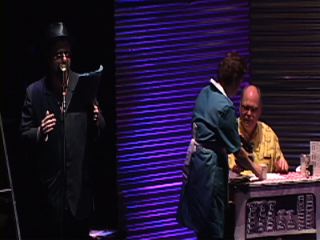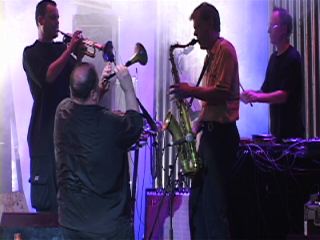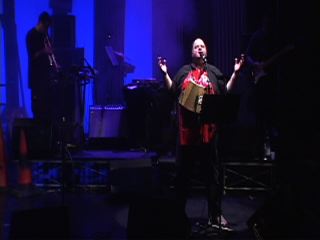
A Geography of Sound in two Acts
by David Thomas and the pale orchestra
He is joined in the production by a cast of extraordinary performers which has included the likes of Van Dyke Parks, Linda Thompson, Bob Holman, Jackie Leven, Syd Straw, Frank Black, Peter Hammil, George Wendt, Daved Hild, Jane Bombane, and others.
Mirror Man is about places that don't exist and a collection of stories about the people who live there - abandoned by the future, forbidden access to the past, and set adrift in a mirage-like Now where Culture has become a weapon used against them, where all the words are owned by liars and everywhere the media are installed as priests and as the sole mediators between man and the world. Native folk culture in 21st Century America is a driven and heroic scrabbling together of Order & Meaning using materials at hand, all the detritus of disposable culture and fragments of pop songs, or handcrafted iconographies along with the odd issue of Popular Mechanics magazine. It is a strange double loopback inversion of cargo culture and you see it everywhere, out there in the middle of nowhere, abandoned gas stations, forlorn handcrafted theme parks: Rattlesnake World, Motel Dust, Cafe Despair... and you ask yourself, "Why did anyone ever think to build that thing out here?" Then you look around and you don't see anyone. "It's trailsign," you say to yourself. "There's been something broken pass throhgh here."
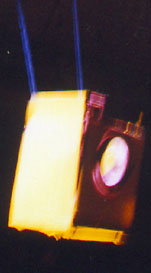
Act 1, Jack & The General, happens Out There. Across a series of roadside diners and truckstops, under bug-swarmed lampposts - interstate susurration in the air - characters tell their stories in the blasted light of one more black coffee dawn. A radio spins out dreams of all the futures that will never be to the backdrop of a neon ghostscape.
Act 2 is sub-titled Surf's Up In Bay City. On the other side of every desert is, and always has been, Bay City. Bay City is where the journey ends, where the unstoppable Great Westward Urge meets the immovable Pacific Object and loses, where all travellers must come to a separate peace or be swallowed up. At a bus-stop in the promised land a set of characters waits for the sense of motion to finally stop... but wondering just what that might actually feel like.
Fronted by the mighty David Thomas, The Pale Orchestra is an ensemble of singers, poets and musicians - accomplished improvisers of both song and soundscape, masters of the expressive voice. The score and libretto encourage spontaneity and inspiration in both music and word, resulting in fresh and surprising nuances each night. It is a process that is in part testifying, in part epiphany and in part misunderstanding.
The inspiration for Mirror Man is Spoon River Anthology by Edgar Lee Masters (1869-1950), a sequence of companion poems published in 1915. Melodramatic, even marginally hysterical, it is distinguished by a powerful narrative vehicle. 244 'residents' of a small town's graveyard tell the stories of their lives. The testimonies, and the sum of the points of view, reveal the secret of the fictional town of Spoon River.
The staging is complemented by Datapanik Installations from information designer John Thompson and incongruous foyer events.
The original cast live recording of Act One is available on cd as Mirror Man, Act 1: Jack & The General by David Thomas and the pale orchestra (Cooking Vinyl Cook CD 175). It was released in 1999.
Mirror Man, v.1
Mirror Man was commissioned by The South Bank, London, and premiered at the Queen Elizabeth Hall, April 3 1998 as part of the four day festival David Thomas: Disastodrome!
Narrator: David Thomas
Radio Voice: Bob Holman
Singers:
Robert Kidney
Linda Thompson
Jackie Leven
Daved Hild
Jane Bombane
Musicians:
Keith Moliné (guitar, electronics)
Andy Diagram (trumpet, electronics)
Jack Kidney (sax & harp)
Peter Hammill (organ, guitar)
Chris Cutler (drums)
Scenographer & technical director: Danny Grace
Foyerdrome: John Thompson
Version 2 was staged at the FIMAV Festival May 21 2000 in Victoriaville, Quebec, Canada.
Narrator: David Thomas
Radio Voice: Bob Holman
Singers:
Robert Kidney
Linda Thompson
Musicians:
Keith Moliné (guitar, electronics)
Andy Diagram (trumpet, electronics)
Jack Kidney (sax & harp)
Chris Cutler (drums)
Scenographer & technical director: Danny Grace
Sound mixer: Paul Hamann
Mirror Man achieved Version 3.0 in the Contemporary Music Network's production of May 2001, a tour of seven cities in England and Scotland. The 2nd Act was completely rewritten and the staging for both Acts was revised to be more pointed and theatrically driven. (Version 3.0, for all intents & purposes, was a new production.)
Narrator: David Thomas
Radio Voice: Bob Holman
Singers:
Robert Kidney
Linda Thompson
Jackie Leven
Daved Hild
Musicians:
Keith Moliné (guitar, electronics)
Andy Diagram (trumpet, electronics)
Jack Kidney (sax & harp)
Chris Cutler (drums)
Scenographer & technical director: Danny Grace
Foyerdrome: John Thompson
Mirror Man Version 3.5 was funded by UCLA Performing Arts for its American premiere February 22 2003, at the Freud Playhouse, UCLA, Los Angeles, as part of the three day Disastodrome Festival. Version 3 featured a significant re-staging.
Narrator: David Thomas
Radio Voice: Bob Holman
Singers:
Robert Kidney
Syd Straw
Van Dyke Parks
Frank Black
George Wendt
Musicians:
Keith Moliné (guitar, electronics)
Andy Diagram (trumpet, electronics)
Jack Kidney (sax & harp)
Georgia Hubley (drums, singer)
Sound mixer: Paul Hamann
Scenographer & technical director: Danny Grace
Foyerdrome: John Thompson
Production assistant: Debbie Wilson
Bob Holman contributed to the libretto.
Commentary from Chris Cutler
Mr. Thomas, whose musical language was shaped by - and famously invoked - the nested environments of Ohio, Lake Erie, Cleveland and its industrial Flats, moved to England in 1984. Only such exiles begin to hear what they do not hear: the familiar echoes of place which place them.How to make such differences in our internalized sonic topology audible?

Mirror Man compares and contrasts, on the field of sound, the senses of place and memory that locate (separate) Americans and English at deep, unconsidered levels in their lives. It tries to show how sounds and the sounds of spaces that have meaning are absorbed, like the languages we speak, out of our concrete environments; that different places underwrite different sensibilities, different expectations and different sonic concepts of 'home'. Thus every geographical space is indelibly inscribed in the imaginations of it's inhabitants, and for the rest of their lives colors and informs their affective responses to sound.
Mirror Man works to evoke and make eloquent these instinctive geographical hearing differences by placing American and British singers and musicians, sensitized to the topic and familiar with each other's cultures and soundscapes (though native only to their own) in a conversational, improvisational musical exchange where they are obliged to express their differences while working together to find points of similarity or mutual comprehension. A process that is in part testifying, in part imagining and in part misunderstanding.
Press Reaction
Robert Clark, The Guardian, 5/25/01 "Brave and highly creative."Andrew Lee, Daily Bruin, 2/25/03 "A haunting picture of longing and loss in the American West."
Ross Fortune, Time Out "It evokes the restless hobo spirit of Harry Partch."
Robin Denselow, The Guardian "Intriguing, atmospheric... a Nineties update of the Kerouac era."
Andy Gill, The Independent "It's an evocation of intangible geographical presence... Thomas using collaborators with a finely-tuned sense of place skillfully sets the mood of suspension you slip into while traveling."
Bill Meyer, Chicago Tribune "Multiple voices and mirage-like accompaniment weave a vivid, multifaceted expression of the troubled space between memory and reality."
